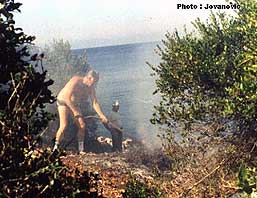
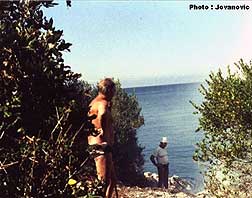
One of our very good friends has a small house near Old Bar on the Montenegrin coast. We thus accepted their invitation to visit, loaded our car on the train, and arrived the following day after a night spent in a sleeping coach.
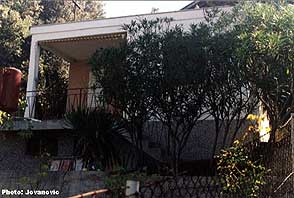
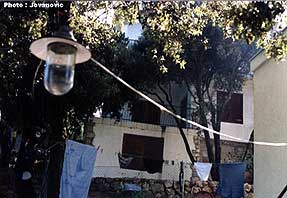
The house was pleasant and comfortable despite its very numerous inhabitants.
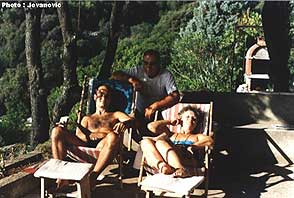 We
were only a few meters away from the beach that was poorly visited at this
time of the year, in September, quite different from the main, truly magnificent
beach, accessible through an old olive grove. There was a multitude of one
hundred year old olive trees, beautiful and peculiar, shaped like the naive
school sculptures. It was very hot. Our daily plan was breakfast, beach,
lunch, rest, then a short walk, and supper. Naturally, we also visited the
surroundings. The road took us to Old Bar, New Bar, and Ulcinj and its beautiful
sand beach. I regret that I only filmed using a movie camera, and did not
take photographs to be able to show you the Old Bar and very picturesque
Ulcinj.
We
were only a few meters away from the beach that was poorly visited at this
time of the year, in September, quite different from the main, truly magnificent
beach, accessible through an old olive grove. There was a multitude of one
hundred year old olive trees, beautiful and peculiar, shaped like the naive
school sculptures. It was very hot. Our daily plan was breakfast, beach,
lunch, rest, then a short walk, and supper. Naturally, we also visited the
surroundings. The road took us to Old Bar, New Bar, and Ulcinj and its beautiful
sand beach. I regret that I only filmed using a movie camera, and did not
take photographs to be able to show you the Old Bar and very picturesque
Ulcinj. 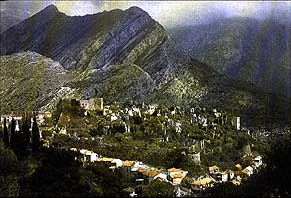
The Old Bar sits on the top of a hill, surrounded by barren, rocky mountains. These are the remnants of an old Roman town known as Antivarium. It was settled by Iliri, then Romans, and finally Byzantines.
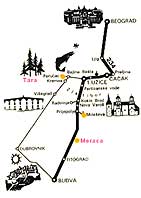
Ulcinj is the last coastal town on the south Adriatic, before the Albanian
border. It is characterized by a great mixture of nationalities and cultures.
One can encounter on its streets Siptars, Albanians, Turks and Montenegrins;
particularly on the very picturesque open market which I enjoyed visiting
so much. One could see there the costumes of all of the above mentioned
nationalities.
After about ten days of visiting with our friends we made a trip whose
itinerary is attached.
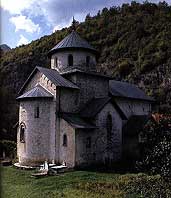
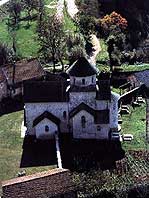
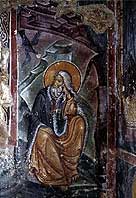 We
first stopped by the beautiful monastery Moraca. The monastery was built
in the canyon the river Moraca, surrounded by the mountains over 2000 meters
high. Moraca was built in 1251/52, and its tutor is Duke Stefan, the son
of the great zupan Vukan, the grandson of the great zupan Stevan Nemanja.
The frescos are magnificent, made by a great artist, but heavily damaged.
The one representing Saint Ilija is the source of greatest admiration for
the visitors.
We
first stopped by the beautiful monastery Moraca. The monastery was built
in the canyon the river Moraca, surrounded by the mountains over 2000 meters
high. Moraca was built in 1251/52, and its tutor is Duke Stefan, the son
of the great zupan Vukan, the grandson of the great zupan Stevan Nemanja.
The frescos are magnificent, made by a great artist, but heavily damaged.
The one representing Saint Ilija is the source of greatest admiration for
the visitors.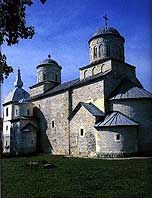
The next segment of our trip leads us to the monastery Mileseva. This monastery is even older than Moraca. Found near the town Prijepolje, it was built in 1218/19; his tutor was Duke Vladislav who became the king of Serbia in 1234. This monastery played an important role in middle Ages. The body of Saint Sava, the greatest Serbian saint, was taken to the monastery from its prior location in Trnovo, Bulgaria; in addition, in 1377 Ban Tvrtko was crowned the king of Serbia and Bosnia in the same monastery. In the XVI century the monastery had its own printing shop. Mileseva is richly decorated with frescos in the category of superb achievements of the Middle age paintings; one of the most beautiful is the fresco representing the Angel guarding Christ's tomb. We stayed overnight in the monastery.
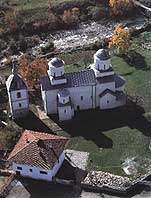
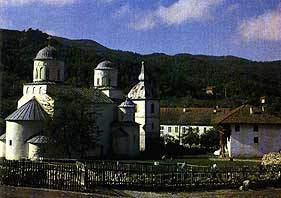
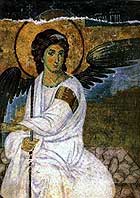
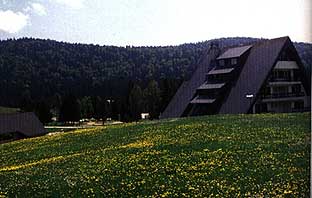
The following day our journey took us to the National Park on the mountain Tara. The road was quite difficult, but worth it given the beauty of the nature and vegetation.
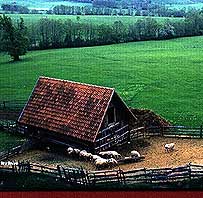
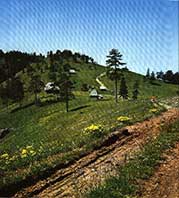
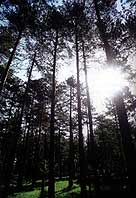
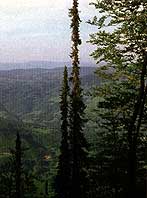
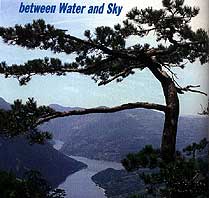
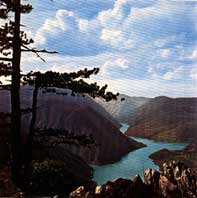
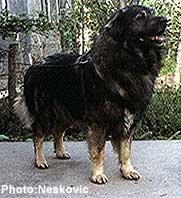 Upon
our return to Belgrade we did not have a great deal of time to visit
the breeders of Sarplaninac. However, we were invited to Goran Neskovic,
who acquired a new dog that year, Dik. He was the son of a Bojovic's
dog and the bitch of Ljubomir Kekanovic, and it arrived from Macedonia.
As the champion of Yugoslavia, he won at all shows. Goran payed for
him good money and was very proud of him. The dog was beautiful, proud,
and moved very gracefully. I was planning to use him as etalon. However,
Dik got ill with the pneumonia and Goran lost him after a few months.
Upon
our return to Belgrade we did not have a great deal of time to visit
the breeders of Sarplaninac. However, we were invited to Goran Neskovic,
who acquired a new dog that year, Dik. He was the son of a Bojovic's
dog and the bitch of Ljubomir Kekanovic, and it arrived from Macedonia.
As the champion of Yugoslavia, he won at all shows. Goran payed for
him good money and was very proud of him. The dog was beautiful, proud,
and moved very gracefully. I was planning to use him as etalon. However,
Dik got ill with the pneumonia and Goran lost him after a few months.
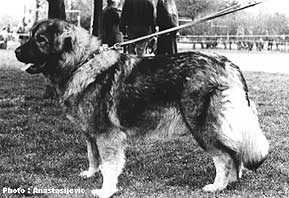
Vesa Vijatov from Borca is the only person who had the opportunity to
use him. From that litter came a few beautiful dogs, particularly Fili
of G. Voja Anastasijevic, one more female of Dusko Dokic, and one brother,
Fred, of G. Babic.
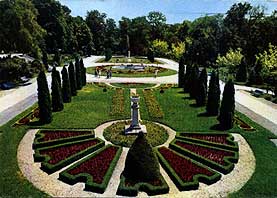
As we went to Cuprija, the birthplace of Stanoje, we dropped by Bjelica and he escorted us to Bukulja, the mountain at whose foot lies the famous spa Bukovicka Banja.
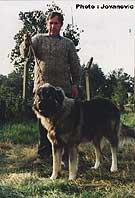
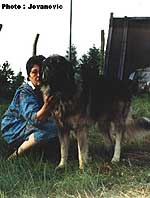
On the top of Bukulja there was a military antenna guarded by Ljubomir
Stevanovic. There we acquainted the impressive, young and tamed Sarplaninac,
Vucko. He was the son of Musa (by Uca). Later on Vucko was owned by Bjelica,
and still later he ended in the military kennel in Nis. He was tall, square,
and had a magnificent head and somewhat light eyes, inherited from his
father Musa.
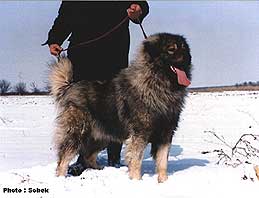
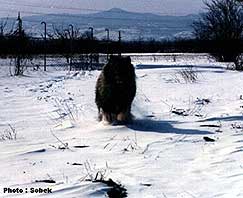
On that occasion we dropped by G. Sobek.
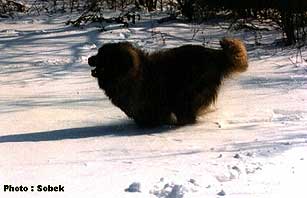
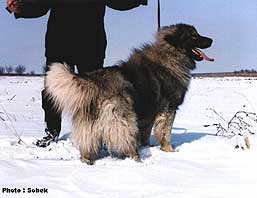
During the winter he sent us the beautiful photographs of Sarplaninac Karl Marks in the snow .
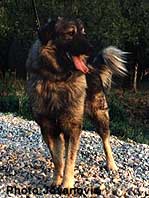
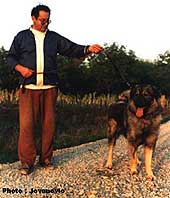
This arouses our curiosity to see the dog. However, as we visited him
the next summer, the dog did not impress us a great deal.